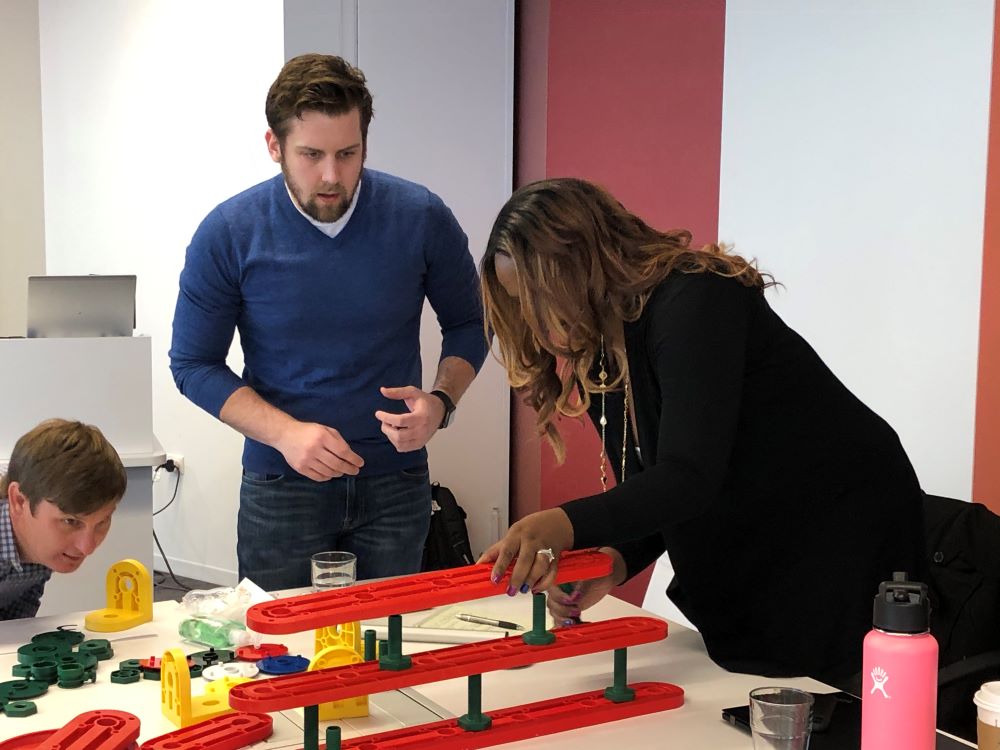Embed Lean thinking with Hands-on Training Activities from MTa
Lean Processing is all about finding out what adds value to your products and services, and which steps in your in processes don’t. Lean Thinking allows you to eliminate waste in materials, time, energy and other resources to help maximise productivity and, ultimately, profits.
And while Lean Thinking came from manufacturing, it can be applied to processes anywhere there’s an opportunity to increase customer: in your sales team, your customer service centre, the IT department, recruitment – you name it!
But a major challenge to Lean thinking is that it has to challenge conventions, routines and ways of working that are well established. Deploying Lean thinking requires a shift in attitudes and behaviours and an openness to change (which we discuss in another article). But people also need to be ready to spot waste before they can eliminate it, and that can be harder than it might seem.
“We’ve always done it that way,” “That’s just the way it is” and “If it ain’t broke, don’t fix it,” are some of the voices you might hear when embarking on a Lean Project. So how do you give people the skills to be able to spot waste, the willingness to address it, and readiness to deploy changes to well-worn processes and systems?
Hands-on experiential learning activities from MTa can help, as they provide a safe environment in which your people can learn about Lean processing by rolling up their sleeves and getting involved in activities that replicate Lean projects.

We’ll introduce some of the most relevant Lean training activities below. But if you’re not sure where to start, it might be easier to give us a call or chat to us and we’ll help.
MTa KanDo Lean was developed specifically with Lean in mind. It’s a highly engaging Lean game that introduces participants to Lean concepts and gets them to think for themselves and challenge the status quo. The focus is on customer service, so it instils thinking that Lean processing needs to be about adding value for customers. It’s a table-top activity that can be used anywhere and explores Lean concepts in five different stages, each taking an hour to 90 minutes.
First, participants are introduced to the seven wastes of Lean so they know what to look out for. They explore themes like understanding product specifications and quality, and identifying surplus materials.
The next phase looks at batch production, but runs the risk of creating too much “work in progress” which has limited actual customer value.

Phase three introduces Kanbans, which allow you to visualise the whole process, the big picture. These diagnostic diagrams allow participants to spot thinks like risks and potential blocks in the process. Themes include overall capacity planning, work distribution and balance, and successful teams should be working to dramatically reduce work in progress.
In phase four, the customer sends in a forecast which impacts production volumes. How will the team respond to variation? Themes like dealing with variable customer requirements, team working and flexibility are important here.
Finally, in phase five, the focus shifts to the wider supplier chain, with production reorganised across three locations. Relationships with suppliers and customers, avoiding inventory shortages and simplification of supply chain components are some of the key themes explored.
While the Lean kit is specifically designed for Lean training, other activities from MTa’s versatile kits can also be used in Lean exercises. Take Over the Bridge, from the MTa Team Kit. This two-part activity offers a chance for refinement and improvement during a second phase so participants have a great opportunity to apply Lean thinking to streamline processes. It also has a strong focus on project management, allowing you to integrate Lean thinking in a project scenario.
Finally, many of the 53 activities in the MTa Insights kit explore themes essential to Lean implementation, like team working, change, communication and problem solving. This versatile kit can be used across your organisation for broader development around themes like leadership and business priorities.

Reflect on your reality
To ensure training participants transfer what they’ve learned around Lean to their own processes in the workplace, they are required to reflect on their learning and consider how to apply it. Every kit includes insightful resources that help participants reflect on what happened in the activities, and to consider the skills, behaviours and attitudes that are necessary to succeed. In a well-facilitated exercise, it is this reflection that provides most of the learning. MTa call this the ‘Learning Arena’ where all participants are encouraged to:
- Identify the positive, indifferent and negative aspects of the activity being reviewed
- Build on positive aspects to make them even more valuable
- Develop ideas to address indifferent and negative aspects
- Evaluate and select ideas to be implemented
- Explore, practise and refine ideas
- Plan the Learning Transfer: how will the learning experience lead to tangible improvements in day-to-day performance
Participants are encouraged to reflect and think for themselves and then share their perspectives with the group. To help that reflection, each Lean activity comes with learning review sheets that should be completed before group discussion.
One of the best ways to see these kits in action and to find out which kit(s) are best for you, is to attend one of MTa’s Facilitator Masterclasses. Here you’ll get unique insights from our experienced facilitators on how to run successful sessions, as well as first-hand experience of the kits and your own reflection.
Call our friendly team today to find out more, or view the full range of MTa’s learning, development and assessment activities at https://www.experientiallearning.org/training-activities/

